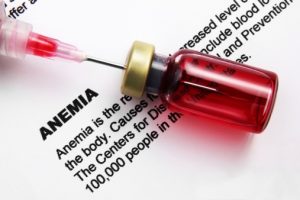
To treat anemia iron supplements are often prescribed, along with a diet of iron-rich foods like red meat or kale. If anemia goes untreated, then major organs, such as our heart and brain, can become affected. Research also shows that it is linked to chronic kidney disease as well.
Causes of anemia in chronic kidney disease
Anemia is commonly seen in individuals with chronic kidney disease; as kidney function declines, so do red blood cells. When the kidneys are healthy they produce what is called erythropoietin (EPO). EPO is responsible for circulating blood to help trigger normal bodily functions, including the production of red blood cells. When kidney function declines, EPO production also decreases, causing bone marrow to produce fewer red blood cells, which leads to anemia.
Other causes of anemia in those with chronic kidney function are low levels of iron, vitamin B12 and folic acid. Other problems with the bone marrow, inflammatory problems, chronic infections and malnutrition can all increase the risk of anemia in chronic kidney disease as well.
Albuminuria, a risk factor for anemia in chronic kidney disease

The rates of anemia were 43 percent higher in those with albumin-to-creatinine ratio (ACR) 30 to 299 mg/g and 86 percent higher with ACR above 300 mg/g.
Due to the research being a cross-sectional study, researchers were unable to determine the exact relationship between albuminuria and anemia.
Symptoms of anemia in chronic kidney disease
Symptoms of anemia in chronic kidney disease include:
- Weakness
- Fatigue
- Headaches
- Concentration problems
- Paleness
- Dizziness
- Difficulty breathing or shortness of breath
- Chest pains
Iron deficiency, anemia and chronic kidney disease
Iron is important for all people, but more so in those with chronic kidney disease. Iron is required to make healthy blood cells to boost bodily functions, so a deficiency in iron can worsen the function of the kidney because it does not receive the oxygen it requires due to a lack of red blood cells.
Treatment of anemia in chronic kidney disease
There are a few different ways to treat anemia in chronic kidney disease, including iron supplementation, erythropoietin, red blood cell transfusion and vitamin B12 and folic acid supplements.
Iron: Iron pills can be an effective first step in treating anemia in chronic kidney disease patients. If levels are severely low, iron may be administered intravenously as well.
Erythropoietin: If kidney disease is the cause of anemia – which can be confirmed through blood work – doctors can use injections to increase EPO. Although injections may aid in kidney function and help treat anemia, they have been linked to cardiovascular events.
Red blood cell transfusion: If red blood cells fall too low, a doctor may prescribe red blood cell transfusion in order to raise red blood cell counts and increase oxygen.
Vitamin B12 and folic acid supplements: Low levels of vitamin B12 as well as folic acid can be contributing factors for anemia, so a doctor may check levels and prescribe supplementation if levels are low.
Diet and nutrition for people with chronic kidney disease
It’s important to eat a healthy diet if you have been diagnosed with chronic kidney disease as many foods can harm your kidneys. For example, red meat is very harsh on your kidneys so you will want to minimize or remove it from your diet. Due to red meat containing high amounts of iron, though, you will need to look for plant-based sources of iron to compensate and avoid anemia, such as kale or spinach.
Here are some other tips for diet and nutrition to keep in mind if you have chronic kidney disease.
- Consume the right protein – as mentioned, red meat can be harmful, so stick with fish, eggs, chicken and plant-based proteins instead.
- Choose heart-healthy foods like beans, whole grains, fruits and vegetables.
- Choose foods with less phosphorus, such as fruits, vegetables and rice products, and avoid items like dairy and soda.
- Choose foods with a good amount of potassium, such as apples, carrots and white rice – foods like bananas have too much potassium.
- Drink plenty of water.
- Cut out sugary drinks like soda or juice.
- Drink alcohol in small amounts and sparingly.
Following these tips can help you with your chronic kidney disease and still provide you with food options that contain iron to reduce your risk of anemia.